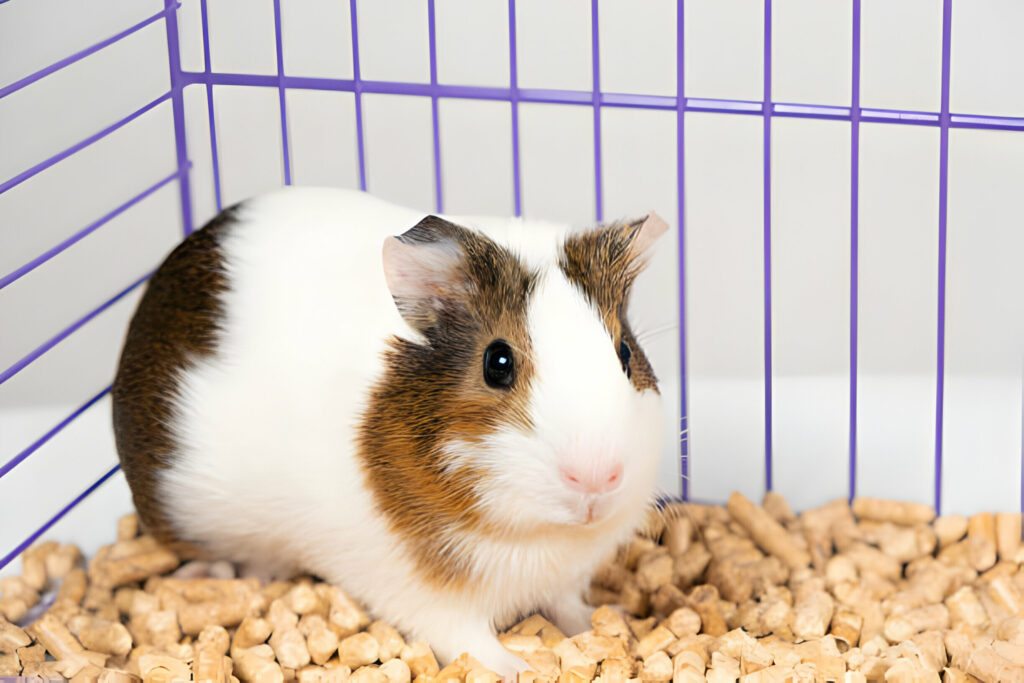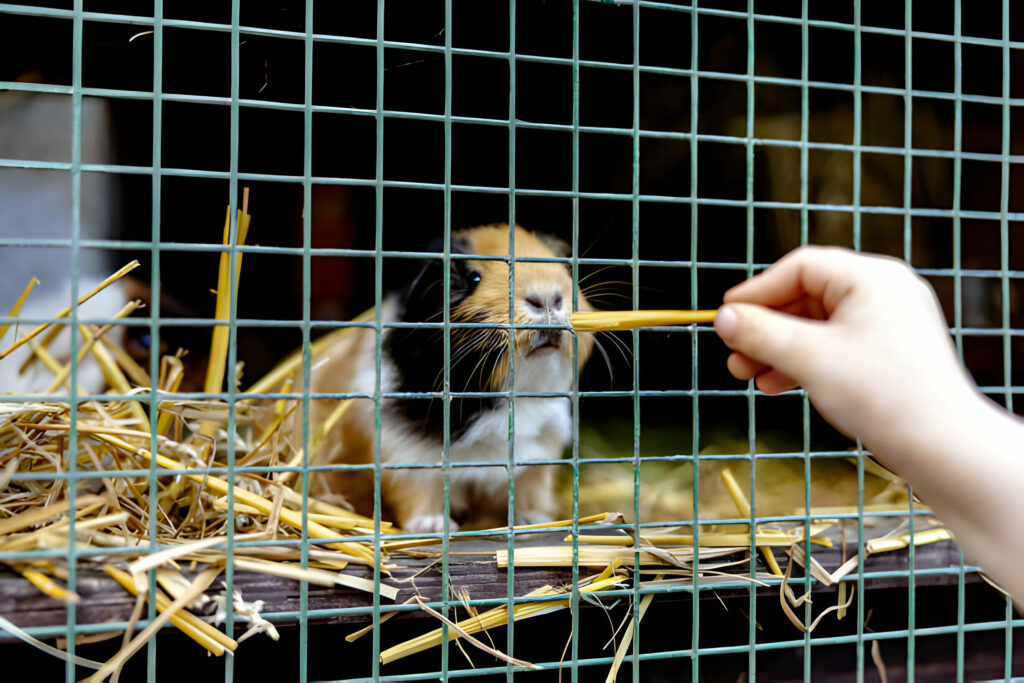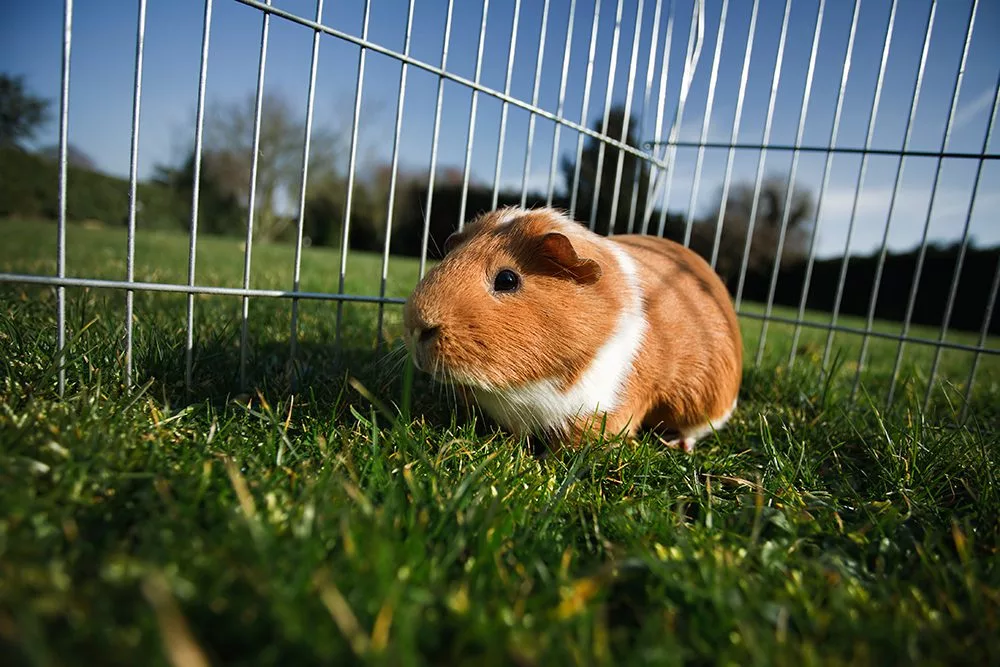Maintaining a clean and hygienic guinea pig cage is essential for the well-being of these charming and lovable little creatures. As responsible guinea pig owners, we are entrusted with their care, and one crucial aspect of that responsibility is ensuring the cleanliness of their living environment.
Imagine living in a space that’s never tidied up, where waste accumulates, and odors linger – it wouldn’t be a pleasant experience, would it? Well, the same holds true for guinea pigs and their cage. A clean guinea pig cage is not just about aesthetics; it’s a fundamental aspect of their health and happiness.
In this comprehensive guide, we’ll delve into the essential question that every guinea pig owner should ponder: “How often should you clean a guinea pig’s cage?”
We’ll explore the signs that indicate when cleaning is necessary, establish daily maintenance routines for your guinea pig cage, outline weekly cleaning tasks, and even venture into the realm of monthly deep cleaning.
By the end of this article, you’ll be equipped with the knowledge and skills to ensure your guinea pig’s cage remains a clean, comfortable, and safe haven. So, let’s embark on this journey towards providing the best possible living conditions for our adorable guinea pig companions.
Contents
Signs Your Guinea Pig Cage Needs Cleaning

As attentive guinea pig owners, it’s vital to recognize the signs that indicate when your guinea pig’s cage is in need of a thorough cleaning.
While maintaining a regular cleaning schedule is essential, there are specific cues that should prompt immediate action. By understanding these signs, you can ensure that your furry friend’s living space remains clean, hygienic, and conducive to their well-being.
- Foul Odors: One of the most apparent signs that it’s time for a cage cleaning is the presence of unpleasant odors. Guinea pig urine and feces can emit strong, ammonia-like smells when left unattended. If you notice an offensive odor, it’s a clear indication that waste has accumulated and needs to be removed promptly. Additionally, a dirty cage can lead to respiratory issues in guinea pigs, making odor control crucial for their health.
- Soiled Bedding: Take a close look at the bedding in your guinea pig’s cage. If you observe that it’s heavily soiled with urine and feces, it’s time for a change. Dirty bedding can be uncomfortable for your guinea pig and increase the risk of skin issues and infections. Regularly inspect the bedding to ensure it remains clean and dry.
- Pests and Insects: An unclean cage can attract unwanted pests and insects, such as flies, ants, and mites. These invaders not only pose a nuisance to your guinea pig but can also transmit diseases and cause stress to your pet. If you notice any signs of pest infestations, it’s essential to clean the cage thoroughly and address the underlying issue.
- Mold and Mildew: Moisture and organic matter in the cage can create an environment conducive to the growth of mold and mildew. These fungi can be harmful to both guinea pigs and humans. If you spot any mold or mildew in the cage or on the bedding, it’s imperative to clean and disinfect the affected areas immediately.
- Decreased Activity: Pay attention to your guinea pig’s behavior. If you notice a decrease in their activity level, reluctance to move around, or spending more time in one corner of the cage, it may indicate discomfort due to a dirty environment. Guinea pigs are naturally clean animals, and a messy cage can stress them out.
- Dirty Food and Water: Check your guinea pig’s food and water containers. If they are consistently soiled with bedding, droppings, or urine, it’s a sign that the cage needs cleaning. Dirty food and water sources can lead to contamination and potential health issues for your pet.
Recognizing these signs is crucial for maintaining your guinea pig’s overall health and happiness. Regular cage cleaning not only ensures a pleasant living environment but also promotes the well-being of your beloved pet.
In the following sections of this guide, we’ll explore how often you should clean your guinea pig’s cage and provide practical tips for effective cleaning routines.
Daily Maintenance
While thorough cage cleanings are necessary at regular intervals, daily maintenance plays a vital role in ensuring your guinea pig’s living space remains clean and comfortable. Establishing a daily routine helps prevent the accumulation of waste, reduces odors, and ensures your pet’s well-being. Here are essential daily tasks to include in your guinea pig care regimen:

- Spot Cleaning: Begin your daily maintenance routine with a thorough spot cleaning. Remove any visible feces, urine-soaked bedding, and uneaten food from the cage. Pay particular attention to the areas where your guinea pig tends to eliminate waste.
- Bedding Fluff: Gently fluff and rearrange the bedding material in the cage. This helps distribute clean and dry bedding, making it more comfortable for your guinea pig. Ensure that the bedding remains dry and odor-free.
- Fresh Water and Food: Check your guinea pig’s water bottle and food dishes. Refill the water bottle with fresh, clean water, and provide a fresh serving of hay, pellets, and vegetables. Remove any leftover or spoiled food to maintain cleanliness.
- Grooming and Interaction: Spend some quality time with your guinea pig during daily maintenance. Brushing your pet’s fur not only helps keep it clean but also strengthens the bond between you and your furry friend. Interaction and gentle petting are essential for their mental and emotional well-being.
- Health Monitoring: While conducting daily tasks, observe your guinea pig’s overall health. Look for any signs of illness, injury, or unusual behavior. Early detection of health issues allows for prompt veterinary care.
- Play and Exercise: Guinea pigs require daily exercise and mental stimulation. Allow your pet to explore a safe, designated play area outside of the cage for a short period each day. Provide toys and tunnels to keep them engaged.
- Environment Check: Ensure that the cage’s environment remains comfortable and free from hazards. Check for any loose or damaged cage accessories, sharp edges, or potential safety concerns.
- Social Interaction: Guinea pigs are social animals and thrive on companionship. If you have more than one guinea pig, observe their interactions daily to ensure they get along and do not display any signs of aggression or bullying.
By incorporating these daily maintenance tasks into your guinea pig care routine, you can create a clean, hygienic, and enjoyable living environment for your furry companions.
This not only promotes their well-being but also strengthens the bond between you and your guinea pigs. In the following sections, we’ll delve into weekly and monthly cleaning routines to complement your daily efforts.
Weekly Cleaning Routine
In addition to daily maintenance, implementing a weekly cleaning routine for your guinea pig’s cage is essential to ensure a healthy and hygienic living environment. This more thorough cleaning process helps remove accumulated waste, refreshes the bedding, and provides an opportunity to clean and disinfect various cage components. Here’s a step-by-step guide to your weekly cleaning routine:
- Prepare Supplies: Gather all the necessary cleaning supplies, including fresh bedding material, a cage disinfectant safe for small animals, a scrub brush, and a dedicated cleaning bucket.
- Transfer Your Guinea Pig: Before beginning the cleaning process, carefully transfer your guinea pig to a secure temporary enclosure or playpen. Ensure that this space is safe, comfortable, and easily accessible for your pet.
- Empty the Cage: Remove all items from the cage, including bedding, toys, dishes, and accessories. Dispose of the soiled bedding and any uneaten or spoiled food.
- Thoroughly Clean the Cage: Using the scrub brush and cage disinfectant, thoroughly clean all cage surfaces, including the base, walls, ramps, and platforms. Pay extra attention to areas where urine and feces tend to accumulate. Rinse the cage components well to remove any residue from the disinfectant.
- Replace Bedding: Add a fresh layer of bedding material to the cage. Ensure that it is evenly distributed to provide a comfortable and absorbent surface for your guinea pig.
- Wash Accessories: Clean and disinfect all cage accessories, such as food dishes, water bottles, toys, and hideaways. Rinse them thoroughly to remove any cleaning product residue.
- Inspect the Cage: While reassembling the cage, inspect it for any signs of wear or damage. Replace or repair any worn-out or broken parts to maintain a safe environment for your pet.
- Return Your Guinea Pig: Once the cage is fully prepared and clean, safely return your guinea pig to its familiar space. Ensure that everything is securely in place and that your pet has access to fresh water, food, and hay.
- Dispose of Waste: Properly dispose of the soiled bedding and waste materials in accordance with your local waste disposal regulations.
- Final Check: Before concluding your weekly cleaning routine, double-check that everything is in order, and the cage is secure and clean. Spend some time interacting with your guinea pig to reassure them after the cleaning process.
By incorporating a weekly cleaning routine into your guinea pig care regimen, you provide a clean and hygienic environment that promotes your pet’s health and well-being. Regular cleaning also helps prevent odors and ensures a pleasant living space for both you and your furry companions. In the next section, we’ll explore the importance of monthly cleaning tasks to maintain a healthy cage.
Monthly Deep Cleaning
While daily and weekly cleaning routines play a crucial role in maintaining your guinea pig’s cage, a monthly deep cleaning is equally important to address hidden dirt, odor, and potential health hazards. This thorough cleaning process ensures that your pet’s habitat remains safe, hygienic, and comfortable. Here’s a comprehensive guide on how to perform a monthly deep cleaning for your guinea pig’s cage:
- Prepare the Area: Before you begin the deep cleaning, ensure you have enough space and all the necessary cleaning supplies. This includes fresh bedding, a cage disinfectant safe for small animals, scrub brushes, a vacuum cleaner, and a dedicated cleaning bucket.
- Secure Your Guinea Pig: Transfer your guinea pig to a secure temporary enclosure or playpen, as you did during the weekly cleaning routine. Ensure that this space is comfortable, safe, and easy for your pet to access.
- Empty the Cage: Remove all items from the cage, including bedding, toys, food dishes, water bottles, and accessories. Dispose of the soiled bedding and inspect the cage components for wear or damage.
- Vacuum and Dust: Use a vacuum cleaner with a hose attachment to thoroughly remove dust, loose hay, and debris from all cage surfaces. Pay close attention to corners, crevices, and hard-to-reach areas.
- Scrub and Disinfect: Using a cage disinfectant designed for small animals, scrub all cage components, including the base, walls, ramps, platforms, and any hiding spots or tunnels. Ensure that you follow the manufacturer’s instructions for safe use. Rinse the cage components thoroughly to remove any disinfectant residue.
- Replace Bedding: Add a fresh layer of clean bedding material to the cage. Ensure it is evenly spread to provide a comfortable and absorbent surface for your guinea pig.
- Clean Accessories: Scrub and disinfect all cage accessories, including food dishes, water bottles, toys, and hideaways. Rinse them thoroughly to eliminate any cleaning product residue.
- Inspect and Repair: While reassembling the cage, inspect all components for signs of wear, damage, or loose connections. Replace or repair any worn-out or broken parts to maintain a secure environment for your pet.
- Air Out and Dry: Allow the cage and accessories to air out and dry completely before reintroducing your guinea pig. Proper drying helps eliminate any lingering odors from cleaning products.
- Return Your Guinea Pig: Once the cage is fully prepared and clean, safely return your guinea pig to its freshly cleaned space. Ensure that all items are securely in place, and your pet has access to fresh water, food, and hay.
- Dispose of Waste: Properly dispose of the soiled bedding and waste materials in accordance with local waste disposal regulations.
- Final Check: Before concluding your monthly deep cleaning, double-check that everything is in order and the cage is secure and clean. Spend time interacting with your guinea pig to help them readjust to their refreshed environment.
Performing a monthly deep cleaning helps ensure that your guinea pig’s cage remains a healthy and inviting home. It prevents the buildup of harmful bacteria and odors while providing your pet with a clean and comfortable living space.
In Conclusion
In conclusion, maintaining a clean and hygienic environment for your guinea pig is vital to their health, well-being, and overall happiness. Regular cleaning routines, including daily, weekly, and monthly tasks, help ensure that your furry friend thrives in a clean and comfortable habitat.
By recognizing the signs that your guinea pig’s cage needs cleaning, you can stay ahead of potential issues and address them promptly. Daily tasks such as spot cleaning and providing fresh food and water are essential for your pet’s daily comfort. A weekly cleaning routine, which includes cage disinfection and bedding replacement, further contributes to a healthy living space.
The monthly deep cleaning routine takes your cage maintenance to the next level by eliminating hidden dirt, odors, and potential health hazards. It provides a fresh start for both you and your guinea pig, creating a clean slate for the weeks ahead.
Remember that a well-maintained cage not only benefits your guinea pig but also enhances your relationship with your beloved pet. It ensures that your guinea pig has a safe, inviting, and pleasant place to call home.
As a responsible guinea pig owner, your dedication to cleanliness and hygiene contributes significantly to your pet’s quality of life. By following these cleaning guidelines and routines, you can enjoy the companionship of a happy and healthy guinea pig for years to come.

